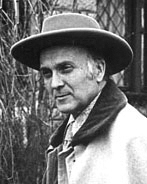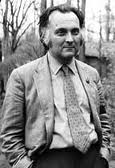-

Duncan on Having “a Tongue that is Ready”
Robert Duncan What I call the Divine is what I begin to divine in the poem…. The dream, the dance, the falling-in-love, and the poem seem to me of one kind. A seizure, given to us, overcoming the pose of the ego, commanding us to attend the need, enthralling us in the spell of a form we must achieve.Read More
-

A Poet’s Credo
This from Lisa Jarnot‘s biography of Robert Duncan, via Seth Lerer’s review at SFGate: A poet does not serve institutions … for he has one allegiance, to his vision of the good of humanity, and he has one responsibility, to the truth of the human spirit. A compelling statement that puts Duncan in the company of writers like Camus and Hikmet. It explains why his poetry—erudite, archetypal, eccentric—feels nevertheless so grounded.Read More
-

Addendum to the Previous Post
Bill Knott has been thinking along some of the lines mentioned in the previous post, though he’s pondering Creeley-Duncan as opposed to Creeley-and-his-wife’s phone log….Read More
-

The Authority of the Poem
“The authority of the poem was a voice of the spirit. To be a poet meant an even fanatic allegiance to a vision or dream, in order that there be Poetry. Men commonly spoke of vision or dream with mistrust. To be a dreamer was ambivalently respected, for dreams rendered men uneasy in their conventional pursuits. A poet must follow his own ideas or feelings wherever they led. In a way, instead of having ideas or feelings, the poet lets ideas and feelings ‘have’ him.” —Robert Duncan, The H.D.Read More
-

Resonances and Hiddenness
“Life shakes like a drum and would discover resonances of what it loves in its own beat, the old man wetting and heating the head of the drum until it answerd the tone he sought that sought him.” —Robert Duncan, “Reflections,” Bending the Bow I’m re-reading all of Duncan’s poetry in my library to prepare for reading The H.D. Book, which just arrived in the mail.Read More
-

Solipsist Jottings
There’s a curious and interesting essay by Christopher Rizzo in the new Jacket Magazine. It’s essentially an response to a rather dismissive October 2007 review by Charles Simic of Robert Creeley‘s The Collected Poems (both Volume I, 1945-1975, and Volume II, 1975-2005). Rizzo is clearly a smart person and a fan of Creeley’s poetry and poetics. My admiration for Creeley is strong, but I have to admit it wanes when I read his work from Pieces on.Read More

 Joseph Hutchison, Colorado Poet Laureate 2014-2019, has published 20 collections of poems and edited or co-edited three poetry anthologies. He currently directs two master’s-level programs for University College at the University of Denver: Professional Creative Writing and Arts & Culture Management. Joe lives with his wife, Melody Madonna, in the mountains southwest of Denver, Colorado, the city where he was born.
Joseph Hutchison, Colorado Poet Laureate 2014-2019, has published 20 collections of poems and edited or co-edited three poetry anthologies. He currently directs two master’s-level programs for University College at the University of Denver: Professional Creative Writing and Arts & Culture Management. Joe lives with his wife, Melody Madonna, in the mountains southwest of Denver, Colorado, the city where he was born. 









